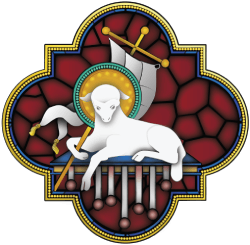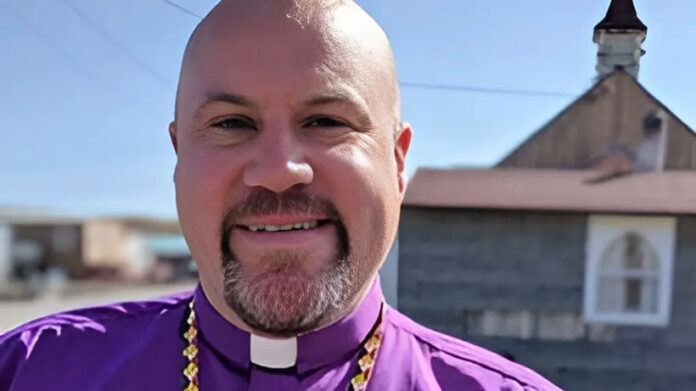By Sue Careless
Joey Royal, Suffragan Bishop of the Arctic, has stunned Anglicans across Canada by leaving episcopal office to take up a new position with an organization that ministers to diplomats and politicians in Ottawa.
Royal has resigned from all three of his diocesan roles: suffragan bishop, director of the Arctic’s theological college and parish rector. His resignation takes effect October 20.
His move will have repercussions not only in the Arctic but across the whole Anglican Church of Canada. His theologically conservative voice will be missed in the House of Bishops and General Synod. He was also an active member of the Council of the North and the Ecclesiastical Province of the Northern Lights, as well as Communion Partners Canada.
He was the Anglican Church of Canada’s representative on the Inter-Anglican Standing Commission on Unity, Faith, and Order.
Except for two years at Huron College in London, Ontario, Royal, who is 43, has spent his entire ordained ministry in the Arctic, the last five years in episcopal office. He was rector of Holy Trinity Anglican Church in Yellowknife, Northwest Territories, as well as director of the Arthur Turner Training School, based in Iqaluit.
While his departure has come as a surprise to everyone else, Royal says it has followed a gradual time of discernment.
The diocesan bishop, David Parsons, is due to retire in December, so during Royal’s recent three-month sabbatical, he pondered whether to stand for election as successor to Parsons. The travel commitments in the vast Arctic diocese are huge; almost all parishes are fly-in, so the diocesan is away from home for weeks at a time. Royal decided that would not be fair to his young family. His son is in Grade 7.
With the help of a clergy coach, as well as a counselor/therapist, Royal recognized that he and his family needed more unhurried time together. He believes all clergy need a therapist if they are to stay healthy while ministering to so many hurting people.
He will move to Ottawa in early November with his wife, Jennifer, and their son, Benjamin. They chose Ottawa as they have family in the capital.
There Royal will become the international relations and operations manager with Christian Embassy of Canada. The organization’s website says it has provided “friendship, support, and spiritual encouragement to members of Parliament, senators, and members of the diplomatic corps” for four decades.
The family will live downtown close to a number of foreign embassies. Royal hopes to “provide spiritual support for those politicians and foreign ambassadors who are Christians, but also have an evangelistic outreach to those who are not.”
He also hopes to pursue more writing and is completing the manuscript for a book on worship. He is the author of two dozen essays for TLC’s online journal, Covenant.
Where will he worship in Ottawa? “We will go where the gospel’s preached. I’m a father. I want my son to be in a parish where I can be confident that is being done.”
Royal grew up in northern Ontario in a family affiliated with the Plymouth Brethren and has Mi’kmaq ancestry on his mother’s side. He became an Anglican while attending Providence University College and Theological Seminary in Manitoba. One of his teachers, theologian Tim Perry, and his wife, Rachel, opened their home to students who crowded into their living room for lively Bible studies each week, which then closed with the 1962 prayer book’s service of Evening Prayer.
Royal’s love for the prayer book has never waned. When he suffered from depression in his early ministry, he found the 1962 Prayer Book could “do the heavy lifting” because it was “always about God and pointed to Christ.”
In contrast, the 1980 Book of Alternative Services was too “thin.” Royal agreed with Canadian theologian Robert Crouse, who said that the BAS “turned worshipers into mere spectators.” At Royal’s parish in Yellowknife, the Anglican Church in North America’s 2019 prayer book has been “well received.”
At the diocese’s triennial synod in Yellowknife in March 2019, Royal was elected and consecrated a suffragan bishop, alongside Annie Ittoshat and Lucy Netser. Royal’s specific responsibilities were the High Arctic and Southern Baffin Island regions, as well as theological education. Royal returned to Yellowknife in 2023 after ministering in Iqaluit from 2015 to 2023.
Royal is proud of the work accomplished by the Arthur Turner Training School, which offers teaching in both English and Inuktitut. He explained that “rather than transplanting a ‘Southern’ education model to the North, we began with the needs of the North in mind. Rather than asking ‘What courses should be in this program?’ we asked ‘What skills and knowledge do Northern people need to minister within their own context?’ From that latter question we developed our outcomes, and then designed a six-module program that would meet those outcomes.
“We do have a great team now teaching and administering the college,” Royal said. “It will be up to the next diocesan bishop to decide who will lead that and what it will look like going forward, but I’m hopeful about the future of this diocese. There are many gifted leaders here in the Arctic.”
Royal, along with the Diocese of the Arctic, remained in the Anglican Church of Canada (ACoC) during the Anglican realignment. Like other Arctic bishops, Royal has opposed theologically liberal trends in the denomination. As a bishop, he voted against the proposed 2019 change to the church’s Marriage Canon that would have officially permitted same-sex marriages; the measure failed to secure the necessary majority among the church’s bishops during the vote at General Synod.
“As a diocese we’ve been very clear that we’re opposed to changing it, and our opposition on this is due simply to our conviction that male-female marriage is divinely given and rooted in creation itself,” Royal said in 2019. “That is how I understand Scripture. I am convinced as well that a change to the Marriage Canon will be destructive to community and relationships at the local, national, and international level.”
In 2023, alongside his fellow Arctic bishops and others, Royal objected to the ACoC’s approval of gender-transition liturgies and said they would not be authorized in the diocese.
While remaining in the ACoC, Royal has also shown openness to those in Anglican realignment churches. Because of the difficulty of finding clergy in the Arctic region, he worked to ensure that the Diocese of the Arctic can continue to license clergy from the Anglican Church in North America, which is not in communion with the ACoC at the provincial level.
In 2023, Royal and Parsons were the only ACoC bishops to attend the Global Anglican Future Conference in Kigali. Royal, has been serving on the Anglican Consultative Council’s Inter-Anglican Standing Committee on Unity, Faith, and Order, said he “hold[s] out hope that the Instruments of Communion can be restructured from within, and that sufficient differentiation can be possible across the Anglican world without a total and irreparable rupture happening. And if such can be avoided it will be only because of the mercy of God, and not because of human scheming or ingenuity.”
In September, Royal responded to a Primate’s Commission proposing several changes to the structures of the ACoC, saying: “Isn’t it strange that the more the ACoC faces its own extinction, the more its leadership speaks in increasingly abstract terms? Last General Synod [2023], we approved five ‘transformational aspirations’ with very little understanding of what any of it is supposed to accomplish. I expect this latest initiative, like much that comes from Church House, means very little and will have very minimal impact.
“The main problem with the ACoC is that for decades it has been ‘reimagining’ itself into the image of the prevailing culture, and not the gospel. More ‘reimagining’ will only make it worse. All of this is a big distraction from the core task our Lord has given the Church in the Great Commission: to evangelize all nations, to baptize new converts, and teach them the Lord’s commandments. That the ACoC’s members are determined to do everything but that is proof that they’ve lost their way.”
What advice does he have for his diocese? “Keep your eyes on Christ. Stay with Christ, the Christ revealed in Scripture. The Holy Spirit, not the spirit of the world, points to Jesus Christ. Don’t lose hope. There are lots of temptations to lose hope but look beyond the immediate to eternity.”
He is convinced that “God has raised up and will continue to raise up whom he needs for his Church. We have very strong leaders in the Arctic and more emerging. There are almost 50 students in our deacons’ program.”
But during his five years in episcopal office, Royal says he has seen the House of Bishops become more “theologically liberal.” He has no time for “multiple truths.” In his farewell letter to his fellow bishops he concluded, “I pray that the Lord would give you grace for perseverance in the cause of the gospel.”
He maintains that “Too often in the Anglican Church of Canada, all sorts of political causes have come before the gospel. We must start with gospel.”
And for Royal the gospel is simple: “God loves all people and has made a way through Christ for us to come to him.”
He believes the Anglican Church of Canada is fundamentally “at odds with Scripture and has walked away from the historic Christian faith, and I lament that. I would love to see it seek repentance. It can change, but only by God’s grace not human ingenuity.”
His admits that his departure from the Arctic is “bittersweet.”
He will miss its “inexpressible” beauty, whether it be its Northern Lights, mountains, valleys, ocean, or icebergs. When he first landed on Baffin Island, he thought he was “entering a National Geographic spread.”
But most of all he will miss its people.
Royal says Canadians would do well to read Kenn Harper’s book In Those Days: Shamans, Spirits, and Faith in the Inuit North (2019), which tells of how early British missionaries in the Arctic embedded themselves in the culture. They dressed as the Inuit and hunted. They learned Inuktitut. Best of all, they partnered with Inuit catechists, who then traveled across the Arctic with the gospel and the Inuit “received it very joyfully.” While no human endeavor is perfect, Royal believes that ministry in the Artic has always been shared.
“There is a deep faith in many people in the Arctic. There is a lot of pain in the Arctic, but it is their faith in Christ that keeps them going. I deeply love them and the immediacy of their faith. In much of the South, if you preach or teach any Scripture about demonic activities or miracles or healings, it is viewed as merely intellectual or psychological. But in the North, we’ve seen all these things. People know this stuff is real. So we bless homes and hold healing services. We’ve all seen miracles.”
He says that his time in the Arctic “sharpened” his faith and “confirmed” it. “God speaks through Scripture. The Bible is the book of God for the here and now. Being here has fundamentally changed me.”




